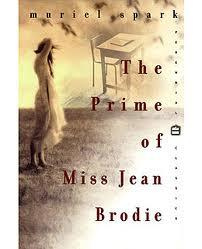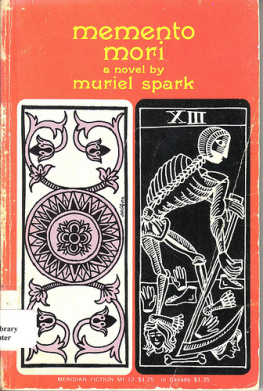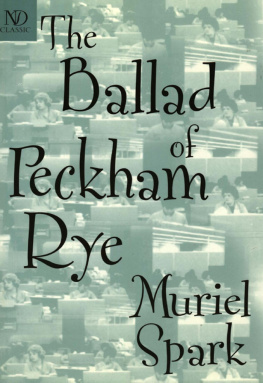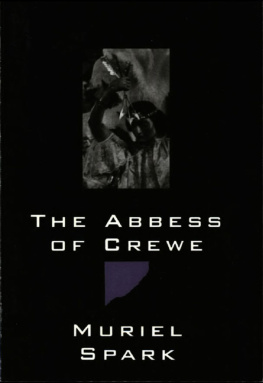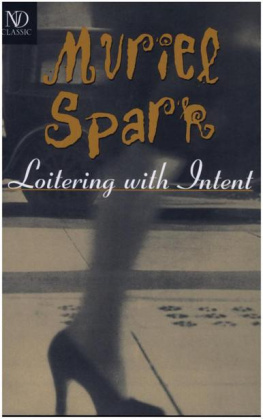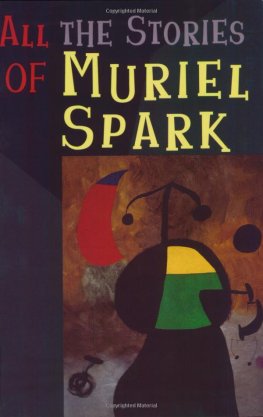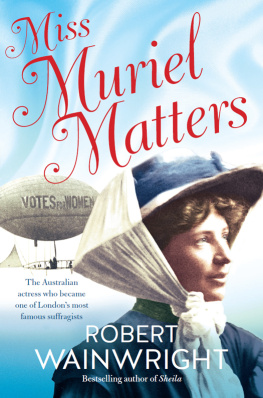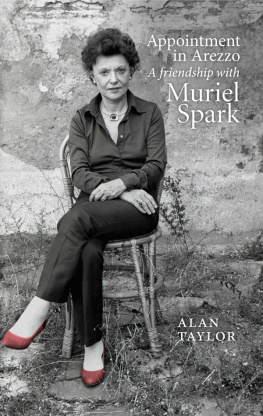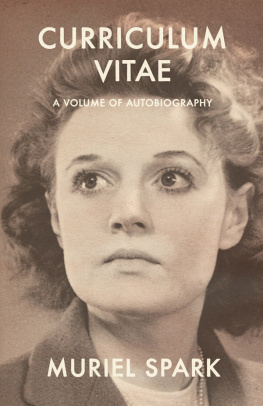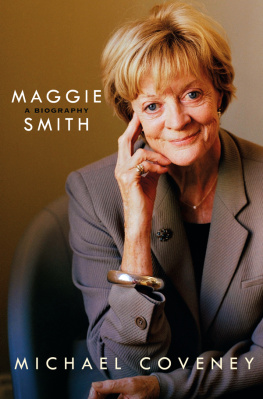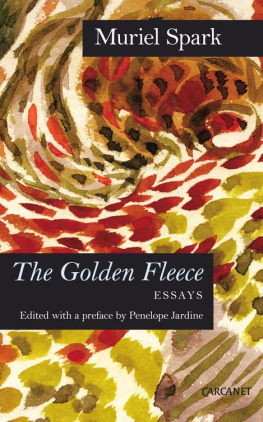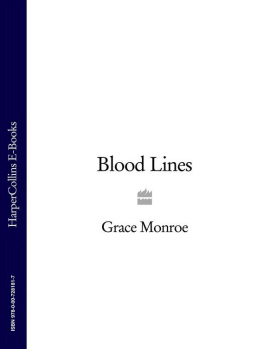Muriel Spark - The Prime of Miss Jean Brodie
Here you can read online Muriel Spark - The Prime of Miss Jean Brodie full text of the book (entire story) in english for free. Download pdf and epub, get meaning, cover and reviews about this ebook. year: 1999, publisher: Harper Perennial Modern Classics, genre: Prose. Description of the work, (preface) as well as reviews are available. Best literature library LitArk.com created for fans of good reading and offers a wide selection of genres:
Romance novel
Science fiction
Adventure
Detective
Science
History
Home and family
Prose
Art
Politics
Computer
Non-fiction
Religion
Business
Children
Humor
Choose a favorite category and find really read worthwhile books. Enjoy immersion in the world of imagination, feel the emotions of the characters or learn something new for yourself, make an fascinating discovery.
- Book:The Prime of Miss Jean Brodie
- Author:
- Publisher:Harper Perennial Modern Classics
- Genre:
- Year:1999
- Rating:4 / 5
- Favourites:Add to favourites
- Your mark:
- 80
- 1
- 2
- 3
- 4
- 5
The Prime of Miss Jean Brodie: summary, description and annotation
We offer to read an annotation, description, summary or preface (depends on what the author of the book "The Prime of Miss Jean Brodie" wrote himself). If you haven't found the necessary information about the book — write in the comments, we will try to find it.
The Prime of Miss Jean Brodie — read online for free the complete book (whole text) full work
Below is the text of the book, divided by pages. System saving the place of the last page read, allows you to conveniently read the book "The Prime of Miss Jean Brodie" online for free, without having to search again every time where you left off. Put a bookmark, and you can go to the page where you finished reading at any time.
Font size:
Interval:
Bookmark:
The Prime of Miss Jean Brodie
Muriel Spark (1961)
The boys, as they talked to the girls from Marcia Blaine School, stood on the far side of their bicycles holding the handlebars, which established a protective fence of bicycle between the sexes, and the impression that at any moment the boys were likely to be away. The girls could not take off their panama hats because this was not far from the school gates and hatlessness was an offence. Certain departures from the proper set of the hat on the head were overlooked in the case of fourth-form girls and upwards so long as nobody wore their hat at an angle. But there were other subtle variants from the ordinary rule of wearing the brim turned up at the back and down at the front. The five girls, standing very close to each other because of the boys, wore their hats each with a definite difference. These girls formed the Brodie set. That was what they had been called even before the headmistress had given them the name, in scorn, when they had moved from the Junior to the Senior school at the age of twelve. At that time they had been immediately recognisable as Miss Brodie's pupils, being vastly informed on a lot of subjects irrelevant to the authorised curriculum, as the headmistress said, and useless to the school as a school. These girls were discovered to have heard of the Buchmanites and Mussolini, the Italian Renaissance painters, the advantages to the skin of cleansing cream and witch-hazel over honest soap and water, and the word "menarche"; the interior decoration of the London house of the author of Winnie the Pooh had been described to them, as had the love lives of Charlotte Bronte and of Miss Brodie herself. They were aware of the existence of Einstein and the arguments of those who considered the Bible to be untrue. They knew the rudiments of astrology but not the date of the Battle of Flodden or the capital of Finland. All of the Brodie set, save one, counted on its fingers, as had Miss Brodie, with accurate results more or less. By the time they were sixteen, and had reached the fourth form, and loitered beyond the gates after school, and had adapted themselves to the orthodox regime, they remained unmistakably Brodie, and were all famous in the school, which is to say they were held in suspicion and not much liking. They had no team spirit and very little in common with each other outside their continuing friendship with Jean Brodie. She still taught in the Junior department. She was held in great suspicion.
Marcia Blaine School for Girls was a day school which had been partially endowed in the middle of the nineteenth century by the wealthy widow of an Edinburgh book-binder. She had been an admirer of Garibaldi before she died. Her manly portrait hung in the great hall, and was honoured every Founder's Day by a bunch of hard-wearing flowers such as chrysanthemums or dahlias. These were placed in a vase beneath the portrait, upon a lectern which also held an open Bible with the text underlined in red ink, "O where shall I find a virtuous woman, for her price is above rubies."
The girls who loitered beneath the tree, shoulder to shoulder, very close to each other because of the boys, were all famous for something. Now, at sixteen, Monica Douglas was a prefect, famous mostly for mathematics which she could do in her brain, and for her anger which, when it was lively enough, drove her to slap out to right and left. She had a very red nose, winter and summer, long dark plaits, and fat, peg-like legs. Since she had turned sixteen, Monica wore her panama hat rather higher on her head than normal, perched as if it were too small and as if she knew she looked grotesque in any case. Rose Stanley was famous for sex. Her hat was placed quite unobtrusively on her blonde short hair, but she dented in the crown on either side.
Eunice Gardiner, small, neat and famous for her spritely gymnastics and glamorous swimming, had the brim of her hat turned up at the front and down at the back. Sandy Stranger wore it turned up all round and as far back on her head as it could possibly go; to assist this, she had attached to her hat a strip of elastic which went under the chin. Sometimes Sandy chewed this elastic and when it was chewed down she sewed on a new piece. She was merely notorious for her small, almost nonexistent, eyes, but she was famous for her vowel sounds which, long ago in the long past, in the Junior school, had enraptured Miss Brodie. "Well, come and recite for us please, because it has been a tiring day." She left the web, she left the loom, She made three paces thro' the room, She saw the water-lily bloom, She saw the helmet and the plume, She look'd down to Camelot.
"It lifts one up," Miss Brodie usually said, passing her hand outward from her breast towards the class of ten-year-old girls who were listening for the bell which would release them. "Where there is no vision," Miss Brodie had assured them, "the people perish. Eunice, come and do a somersault in order that we may have comic relief." But now, the boys with their bicycles were cheerfully insulting Jenny Gray about her way of speech which she had got from her elocution classes. She was going to be an actress. She was Sandy's best friend. She wore her hat with the front brim bent sharply downward; she was the prettiest and most graceful girl of the set, and this was her fame. "Don't be a lout, Andrew," she said with her uppish tone. There were three Andrews among the five boys, and these three Andrews now started mimicking Jenny: "Don't be a lout, Andrew," while the girls laughed beneath their bobbing panamas.
Along came Mary Macgregor, the last member of the set, whose fame rested on her being a silent lump, a nobody whom everybody could blame. With her was an outsider, Joyce Emily Hammond, the very rich girl, their delinquent, who had been recently sent to Blaine as a last hope, because no other school, no governess, could manage her. She still wore the green uniform of her old school. The others wore deep violet. The most she had done, so far, was to throw paper pellets sometimes at the singing master. She insisted on the use of her two names, Joyce Emily. This Joyce Emily was trying very hard to get into the famous set, and thought the two names might establish her as a something, but there was no chance of it and she could not see why.
Joyce Emily said, "There's a teacher coming out," and nodded towards the gates. Two of the Andrews wheeled their bicycles out on to the road and departed. The other three boys remained defiantly, but looking the other way as if they might have stopped to admire the clouds on the Pentland Hills. The girls crowded round each other as if in discussion.
"Good afternoon," said Miss Brodie when she approached the group. "I haven't seen you for some days. I think we won't detain these young men and their bicycles. Good afternoon, boys." The famous set moved off with her, and Joyce, the new delinquent, followed. "I think I haven't met this new girl," said Miss Brodie, looking closely at Joyce. And when they were introduced she said: "Well, we must be on our way, my dear." Sandy looked back as Joyce Emily walked, and then skipped, leggy and uncontrolled for her age, in the opposite direction, and the Brodie set was left to their secret life as it had been six years ago in their childhood.
"I am putting old heads on your young shoulders," Miss Brodie had told them at that time, "and all my pupils are the crme de la crme." Sandy looked with her little screwed-up eyes at Monica's very red nose and remembered this saying as she followed the set in the wake of Miss Brodie.
"I should like you girls to come to supper tomorrow night," Miss Brodie said. "Make sure you are free."
"The Dramatic Society..." murmured Jenny.
"Send an excuse," said Miss Brodie. "I have to consult you about a new plot which is afoot to force me to resign. Needless to say, I shall not resign." She spoke calmly as she always did in spite of her forceful words.
Next pageFont size:
Interval:
Bookmark:
Similar books «The Prime of Miss Jean Brodie»
Look at similar books to The Prime of Miss Jean Brodie. We have selected literature similar in name and meaning in the hope of providing readers with more options to find new, interesting, not yet read works.
Discussion, reviews of the book The Prime of Miss Jean Brodie and just readers' own opinions. Leave your comments, write what you think about the work, its meaning or the main characters. Specify what exactly you liked and what you didn't like, and why you think so.

